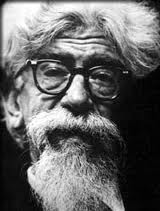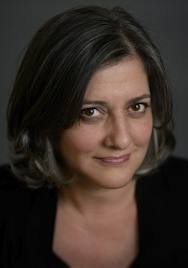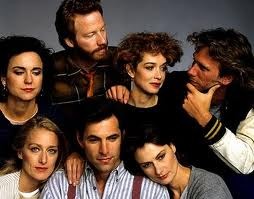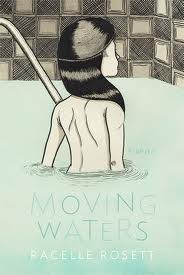
It takes a lot for this atheist to go near anything near spirituality, but of course literature is my religion, to steal, joyfully, from the late Christopher Hitchens. But the Lord moves in mysterious ways, and waters, and one of the unseemly if welcome pleasures of editing a terrific literary journal is checking the contents of the advance readers' copy of a past contributor to the magazine, to locate perhaps a short story first published in the Santa Monica Review. Unseemly because one shouldn't need or desire affirmation but well, there it is, a few pages turned to see a title or read an acknowledgement, good for five minutes of comfort until returning to the giant stack of submissions, and your perverse duty to reject nearly all of them. Weird work, if you can get it.
]
Especially rewarding then, to find the big iceberg, after having sat only on its tip, to be opened up further to a worldview, an imagination, to possibility and the pleasure of being immersed in good writing, not to mention being affirmed once again in one's own (good) taste!

Yes, the title story of Racelle Rosett's collection of eighteen sad, beautiful, funny short stories appeared in SMR, but I must not have understood that this mitzvah of a tale meant that there were in fact so many more, some published, some not. Moving Waters, her first collection, connects via the quotidian and the–forgive me–spiritual, the richly lived everyday lives of a congregation of characters, individual members of a Reform temple in Los Angeles, probably Hollywood, made up of writers, producers, successful professionals, Pilates practitioners and Prius drivers, young and old, who embrace ritual, one per story, minimum, to create or restore or to find solace.
They shop at The Grove, eat at Mozza, buy groceries at Western Kosher, and include, speaking of immersion, a woman who leaves her otherwise perfectly good family and jolly husband for the nanny, and feels compelled to jump in the tub of purification called the mikvah. Ritual immersion, ironic here and yet also empowering, not to mention funny, as so many of these stories.The water is alive, blessed and so “moving,” this ritual formerly limited to cleansing menstruating women and sometimes men but here, meant to help get through a divorce. The main character, who leaves her hapless and completely innocent groom Howie, tells her new, young girlfriend she is going to yoga, but instead does the dip. As in each story, the ritual somehow is given new meaning, sometimes subverting its intentions and sometimes fully realizing and even more. Here the ritual is turned, perhaps brazenly, into something new and liberatory, though with maybe ominous consequences. Big magic! Simultaneously genuine yet also dangerously postmodern.

There is the slightly Aspergery boy who explains Judaism to us, the beautiful lady rabbi who plays a beautiful lady rabbi on television, a wife sitting shiva for the mother who warned her not to marry, an elderly woman writing an ethical will for the benefit (or something) of her disappointing children, a religious convert who, as in many of the stories, seems to embrace doubt as much as faith, a widow who, in one of the strongest stories, gets a makeover to prepare for the one-year anniversary of her husband's death and, perhaps, to also begin looking for new love, new life. Or so we hope for her.
There is sadness in these stories, loss and desire. There is so much deep, deep love. No other way to say it. I have not read stories lately that, honestly, friends, made me immediately want to rush home to my wife and son like these did, and which so confused my feelings and perceptions of emptiness and fullness. In a good way.
And did I mention that they are funny, too? The woman who marries and endures (my word) the long business of learning the faith, but who can't bring around her brother in law: “I'm converted,” she would remind him. “I'm a Jew.” Well,” he would say, “you're Jew-ish.” Ha!
There is the immediacy and sly, almost ephemeral everydayness of movie star neighbors and upscale life in Los Angeles, the Farmer's Market and fundraisers and driving the kids to school and lessons and synagogue. “My father is a cantor, an old school baritone with a voice that is a place.” The place is at once old history and tradition and, for his kid, LA, now. “Sarah Silverman's sister is a rabbi–it's that kind of town.”
Rosett is a literary writer (Ploughshares), a Jewish writer (winner of both the Moment Magazine-Karma Foundation Prize and Lilith Fiction Prize), an award-winning TV writer

(for thirtysomething), a wife and parent, and in creating these remarkable stories she is a neighborhood storyteller with the moral authority and sly disguise that suggests she is also one or all of the people we meet. She is also the center of attention somehow, the person who pays attention. I am thinking of Grace Paley, but with longer sentences, less dialog and even more of an effort to match place and circumstance. The sentences rush to their juxtapositions, put together physically to cause the required existential tension, just like that. From a sad, sad story involving a dead husband and that cute, now pregnant Prius-driving rabbi: “The newlywed couple had been to Cedars four times this month to ready her body for in-vitro. Rabbi Beth had not eaten breakfast this morning and thought that meant she would not throw up, but she did, deftly, almost between thoughts, into the wastebasket under her desk.”

There is a story or two about storytelling itself, and a big, dramatic one about a man raised by women, abandoned by men, whose experience of ritual is met by something more urgent in a killer ending. There is Eros a-plenty, in sexy writing about love and commitment and duty. Happily for the reader, all of the characters–not just the progressive rabbi, who appears in a bunch of these stories–are conscious of their place in the telling, whether of rituals commemorating terrible tragedy or of celebration, and in the narration of these elegantly dramatized morality stories. “Every day the world is new. The day before Jonah died there was one world. The following day there was a world without Jonah. There are a hundred Jewish stories in which the world makes sense. In the stories the wicked are punished and the good are rewarded. I don't need to tell you that this is not true.”
But Racelle Rosett does need to tell it. And thank You Know Who that she has told.
Moving Waters, Racelle Rosett, Argo Narvis, 157 pps., $14
Andrew Tonkovich hosts the Wednesday night literary arts program Bibliocracy Radio on KPFK 90.7 FM in Southern California.
Follow OC Weekly on Twitter @ocweekly or on Facebook!

